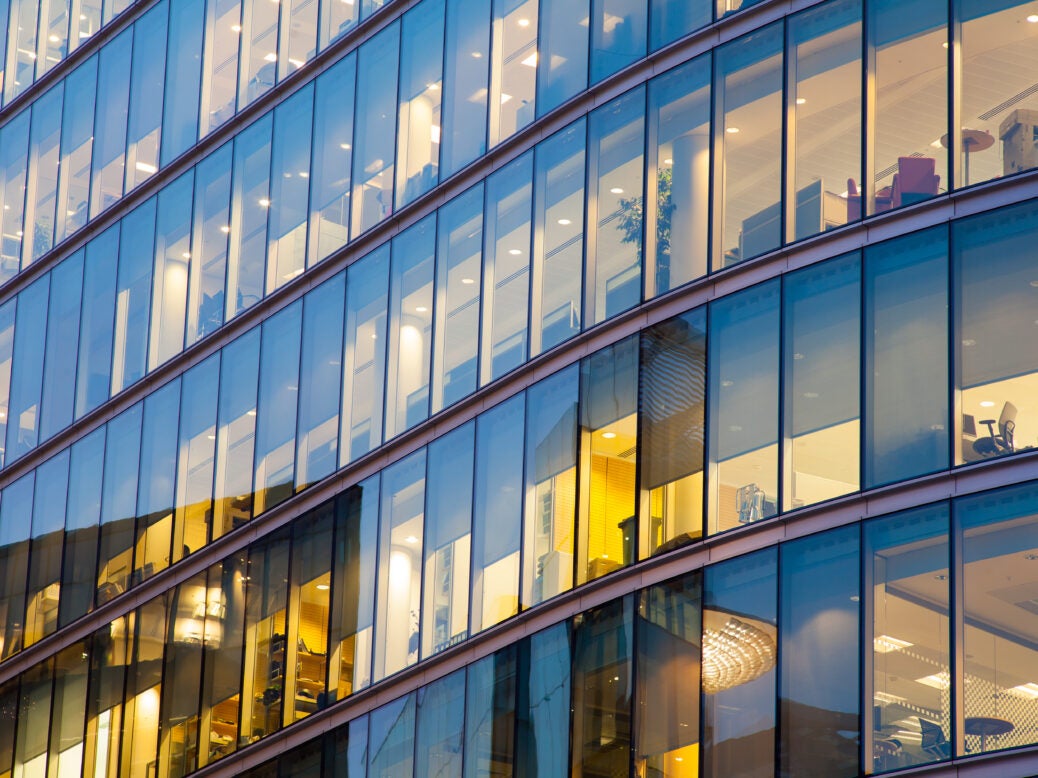
The London office property market has remained resilient in the face of the pandemic, writes Katharine Swindells
After two years of work from home mandates, the end of 2021 finally saw a strong rebound for Central London office property as people started to return to the workplace. Monthly take-up surpassed pre-pandemic levels for the first time in December 2021, and early figures from January show that trend continuing — proving the resilience of the corporate property market. Take up will likely continue to improve now that plans to drop all remaining Covid restrictions in England have been confirmed.
Analysis by Savills found that in December, monthly Central London office take up rose by 32 per cent month on month to reach 1.39 million square feet. Overall, 2021 saw a take up of 9 million square feet — still 21 per cent lower than in 2019, but almost double 2020’s take up. In January, early estimates suggest take up of at least 536,000 square feet, a number likely to be revised afterwards as the last deals are documented, 12 per cent high than in January 2019.
‘People are back at work, and they’re back in numbers,’ Philip Pearce, head of Central London Offices at Savills, said. ‘And it’s very noticeable in the city how it’s beginning to feel a lot more like normal, or the old normal.’
The influx of people returning to the office has combined with demand for higher quality office space, so competition is steep. And while many companies have significantly grown their workforce over the past two years, new building development has been slowed, creating a tight supply across the city.
Demand has been rising strongly since spring 2021, but December was the largest monthly take up since July 2019.
There is strong demand across the city, but in many areas, supply is governing decision-making, and forcing companies to look beyond their usual region. Around 45 per cent of take up in the second half of 2021 in the City Core Corporation area and its fringe, slightly lower than in the same period in 2019. Meanwhile other regions have seen significant growth: Kensington and King’s Cross have seen take up increase more than ten-fold compared to 2019, while Paddington has seen take up triple.
And this uptick in demand is coming alongside higher standards when it comes to the quality of the property. In 2019 and 2020, 79 per cent of central London office take up was of Grade A quality. In 2021, the amount of Grade A office take up doubled year on year, accounting for nine-tenths of office take up.
This means companies are prioritising not just the location of their office space, but also the quality of the space to make sure it is conducive with employee productivity and wellbeing, and the building’s energy efficiency and sustainability credentials.
‘There’s a recognition amongst most occupiers that the return to nine to five, five days a week is probably never going to happen,’ Pearce added. ‘And therefore they know they’ve got to earn somebody’s commute.’
As the conversation around remote working and hybrid working has developed, companies have had to adapt their plans and policies — some more easily than others.
As the city began to reopen in late spring 2021, smaller office spaces made up a larger proportion of deals, as smaller companies had the flexibility to adapt their working policies with the quickly-changing health landscape.
But the past six months have seen a resurgence of large deals: both from larger companies committing to their hybrid working, and from companies that had downsized, and now look to reverse that decision, and in Q4, eight per cent of deals were for over 50,000 square feet.
Image: Shutterstock






